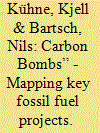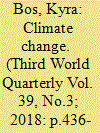| Srl | Item |
| 1 |
ID:
186426


|
|
|
|
|
| Summary/Abstract |
Meeting the Paris targets requires reducing both fossil fuel demand and supply, and closing the “production gap” between climate targets and energy policy. But there is no supply-side mitigation roadmap yet. We need criteria to decide where to focus efforts.
Here, we identify the 425 biggest fossil fuel extraction projects globally (defined as >1 gigaton potential CO2 emissions). We list these “carbon bombs” by name, show in which countries they are located and calculate their potential emissions which combined exceed the global 1.5 °C carbon budget by a factor of two. Already producing carbon bombs account for a significant percentage of global fossil fuel extraction. But 40% of carbon bombs have not yet started extraction.
|
|
|
|
|
|
|
|
|
|
|
|
|
|
|
|
| 2 |
ID:
158914


|
|
|
|
|
| Summary/Abstract |
Under the Paris Agreement, 80% of all proven fossil fuel reserves become stranded resources and investments already made in such resources turn into stranded assets. Much of the existing literature focuses on equitable burden sharing; only a few articles examine the risks for developing countries that invest in new fossil fuels. Hence, this paper addresses the question: What are the risks of investing in fossil fuels for developing countries? In doing so, it examines Kenya, a prospective fossil fuel producer, and China, an investor in fossil fuels. In terms of short- to long-term risks, ignoring new fossil fuels and investing in renewables is favourable and politically, socially, ecologically and economically more rewarding, not least because latecomers to development run the risk of having to compensate investors when new fossil fuel assets strand prematurely and become unrecoverable.
|
|
|
|
|
|
|
|
|
|
|
|
|
|
|
|